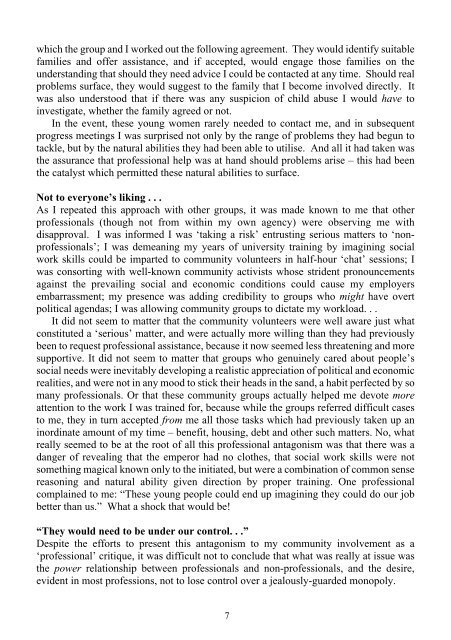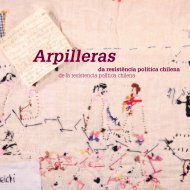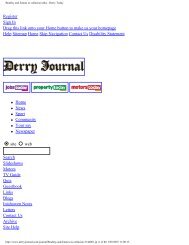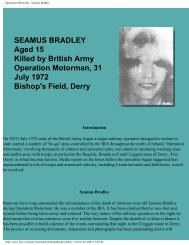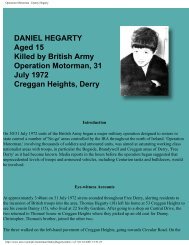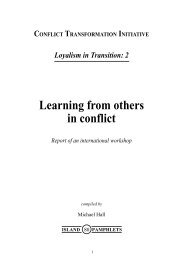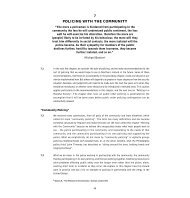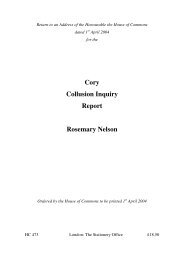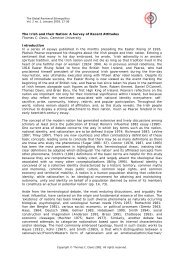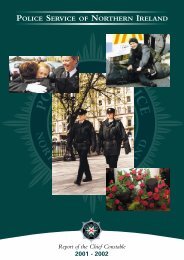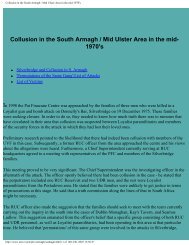(14) Reinforcing Powerlessness - CAIN - University of Ulster
(14) Reinforcing Powerlessness - CAIN - University of Ulster
(14) Reinforcing Powerlessness - CAIN - University of Ulster
Create successful ePaper yourself
Turn your PDF publications into a flip-book with our unique Google optimized e-Paper software.
which the group and I worked out the following agreement. They would identify suitablefamilies and <strong>of</strong>fer assistance, and if accepted, would engage those families on theunderstanding that should they need advice I could be contacted at any time. Should realproblems surface, they would suggest to the family that I become involved directly. Itwas also understood that if there was any suspicion <strong>of</strong> child abuse I would have toinvestigate, whether the family agreed or not.In the event, these young women rarely needed to contact me, and in subsequentprogress meetings I was surprised not only by the range <strong>of</strong> problems they had begun totackle, but by the natural abilities they had been able to utilise. And all it had taken wasthe assurance that pr<strong>of</strong>essional help was at hand should problems arise – this had beenthe catalyst which permitted these natural abilities to surface.Not to everyone’s liking . . .As I repeated this approach with other groups, it was made known to me that otherpr<strong>of</strong>essionals (though not from within my own agency) were observing me withdisapproval. I was informed I was ‘taking a risk’ entrusting serious matters to ‘nonpr<strong>of</strong>essionals’;I was demeaning my years <strong>of</strong> university training by imagining socialwork skills could be imparted to community volunteers in half-hour ‘chat’ sessions; Iwas consorting with well-known community activists whose strident pronouncementsagainst the prevailing social and economic conditions could cause my employersembarrassment; my presence was adding credibility to groups who might have overtpolitical agendas; I was allowing community groups to dictate my workload. . .It did not seem to matter that the community volunteers were well aware just whatconstituted a ‘serious’ matter, and were actually more willing than they had previouslybeen to request pr<strong>of</strong>essional assistance, because it now seemed less threatening and moresupportive. It did not seem to matter that groups who genuinely cared about people’ssocial needs were inevitably developing a realistic appreciation <strong>of</strong> political and economicrealities, and were not in any mood to stick their heads in the sand, a habit perfected by somany pr<strong>of</strong>essionals. Or that these community groups actually helped me devote moreattention to the work I was trained for, because while the groups referred difficult casesto me, they in turn accepted from me all those tasks which had previously taken up aninordinate amount <strong>of</strong> my time – benefit, housing, debt and other such matters. No, whatreally seemed to be at the root <strong>of</strong> all this pr<strong>of</strong>essional antagonism was that there was adanger <strong>of</strong> revealing that the emperor had no clothes, that social work skills were notsomething magical known only to the initiated, but were a combination <strong>of</strong> common sensereasoning and natural ability given direction by proper training. One pr<strong>of</strong>essionalcomplained to me: “These young people could end up imagining they could do our jobbetter than us.” What a shock that would be!“They would need to be under our control. . .”Despite the efforts to present this antagonism to my community involvement as a‘pr<strong>of</strong>essional’ critique, it was difficult not to conclude that what was really at issue wasthe power relationship between pr<strong>of</strong>essionals and non-pr<strong>of</strong>essionals, and the desire,evident in most pr<strong>of</strong>essions, not to lose control over a jealously-guarded monopoly.7


